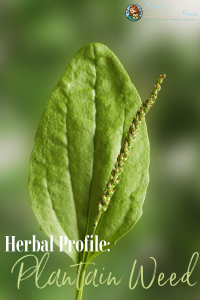By Sarena-Rae Santos, Natural Health Blogger
What is Plantain Weed
Plantain weed, also known as Plantago major is an herbaceous perennial with a rosette of leaves 6-12 inches in diameter, 5-15 inches tall, leafless, unbranched, stems with clusters of inconspicuous greenish or whitish colored flower clusters. Plantain weed is often referred to as broadleaf plantain, buckthorn plantain, and rippleseed plantain (1). This herbaceous perennial with large, oval-shaped leaves can be eaten raw or cooked but is often dismissed as a pervasive garden pest despite its long history of medicinal properties.
Health Benefits of Plantain Weed
Despite sharing its name, plantain weed is unrelated to plantain fruit, a type of banana, and has its own set of health benefits such as:
May Decrease Inflammation
In several studies, plantain weed was shown to help decrease inflammation. Chronic inflammation has been linked with many diseases, such as type 2 diabetes, asthma, and certain cancers (2). The leaves of plantain weed contain several anti-inflammatory compounds, including flavonoids, terpenoids, glycosides, and tannins. An animal study found that administering plantain weed extract to rats decreased several markers of inflammation caused by liver injury (3). Another animal study uncovered similar findings, documenting that plantain weed extract significantly reduced inflammation and reduced liver enzymes to protect against liver damage (4). Test-tube studies propose that plantain seeds may reduce several markers of inflammation and delay the growth of distinguishing cancer cells (5).
May Support Digestive Health
Several chemical constituents in plantain weed seeds and leaves have helped alleviate specific digestive problems (6). For instance, the seeds contain psyllium, a fiber typically used as a natural laxative due to its ability to absorb water as it moves through your digestive tract (7). An animal study discovered that narrow-leaf plantain extract promoted the healing of stomach ulcers in rats (8). Other animal studies indicated that plantain weed’s anti-inflammatory properties might oblige digestive issues like inflammatory bowel disease (IBD), which can generate symptoms like stomach pain, bloating, and diarrhea (9). One review found that plantain leaves may slow your digestive tract’s activity, which may encourage bowel regularity and help treat diarrhea (10).
May Promote Wound Healing
Some research documents that plantain weed may support wound healing by relieving inflammation, intercepting microbial growth, and alleviating pain (11). In an animal study, when aloe vera and plantain weed were applied topically, they enhanced wound healing and improved tissue repair (12). In another animal study, applying only plantain weed extract to wounds enabled an increased recovery rate compared to the control group (13). This isn’t just in animals; a study of 40 people discovered that applying a gel containing aloe vera and plantain weed assisted in healing foot ulcers (14).
May Promote Respiratory Health
Plantain weed has been used to ease coughs and other respiratory problems. The coating of seeds has carbohydrate polymers that absorb water and form mucilage with a high viscosity (15), which helps soothe, moisten, and protect the throat and respiratory system. A few studies in Bulgaria have demonstrated that it can effectively treat chronic bronchitis (16,17).
Safety Concerns
Mainstream sources claim there isn’t enough reliable information to know if great plantain is safe to use when breastfeeding and caution to stay on the safe side and avoid use (18). Contrarily, trusted herbalist Richard Whelan states it is incredibly safe to use in high or frequent doses if necessary. It may be taken by the young or old while pregnant or during breastfeeding with confidence (19).
How to Use Plantain Weed
You can find plantain weed in dried bulk, capsules, powders, extracts, oils, or tinctures. Tinctures always contain the most concentrated amount of herbs. Teas and soups are also options, especially when following ayurvedic medicine recipes. Some great articles to check out featuring the use of plantain weed include:
Follow the recommendations of any supplement; some of my recommendations include:
- Earthley’s Anti-Itch Soap cools the itch of poison ivy, sumac, and oak using nourishing oils to soothe and heal the skin naturally. Say goodbye to the dry itch and hello to beautifully radiant skin.
- Earthley’s Sun Soothe After Sun Lotion is an all-natural, after-sun lotion to help calm skin that has been exposed to the sun. This cooling lotion helps to relieve pain and redness, prevent peeling, and moisturize the skin.
Disclaimer: This post is not intended as medical advice. These statements have not been evaluated by the FDA, and nothing in this post is intended to diagnose, treat, or cure anything. If you have questions, please do your own research or seek advice from a health professional.


